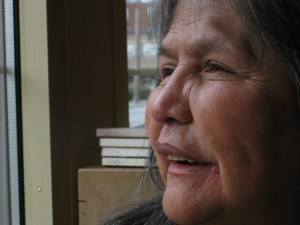Rose Henry’s Coast Salish roots run deep. They run so deep through the local activist that she simply has to be blunt in her assessments of Canadian government. Blunt, because she has lived the truth the government won’t speak of.
“Mainstream society has been denied their right to hear the truth of what an entire race of Canadians has suffered,” she says. “Unfortunately, in the normal course of a discussion, the Canadian government won’t use words that end in ‘ide’ or ‘ism.’ But what they call assimilation I call genocide and racism.”
Henry was once a student here at Camosun College. And while her analysis of the government is scathing, she recalls classes at the college back in 1985 with affection.
“I remember one teacher who taught with great compassion,” she says. “He talked about the different ways of learning and thought my ability to read a person was a rare gift. Maybe I can’t write well but he validated my other strengths.”

Henry, who was raised in the oral tradition, never mastered the written word. She tests verbally at a third-year university level but writing exams was a struggle for her during her time at Camosun.
But her story starts long before her struggles here. In 1985, she decided to leave the small town of Tle’men (located just north of Powell River) with her young son to come to Victoria. She had visited the city before and knew she wanted to return.
“I left for a better future for myself and my son,” she says. “Education is important to me, but I looked too at the future of employment and realized if I stayed in a small town my options were limited. I had good memories of coming to Victoria as a child with my foster mom, so I knew that was where I wanted to go.”
But it wasn’t smooth sailing from there. In 1985, Victoria was on the brink of a general strike, a tough situation to understand for a lone, tired, and scared young woman pushing her son in his carriage every day to and from school. And because Henry is also a child of the Sixties Scoops, she views everything the general population is doing with suspicion.
“Because of the strikes there were no buses running and no garbage pickup; it was terrible,” she says. “I remember calling my mom to ask if I got dropped off at the right city because this one didn’t look at all like the one on the postcards.”
Since then, Henry has managed to become one of Victoria’s most prominent and tireless activists, often working in the side of the city that doesn’t look anything like a postcard. She founded the Committee to End Homelessness, has run for office, sits on various boards, and is a speaker on human-rights issues. Her work has taken her to Scotland and South Africa.
And Henry’s advice for Camosun students who want to see social change is simple.
“Get involved in the electionsŃall of them,” she says. “Every vote is a marker for social change; every election, a demonstration.”

